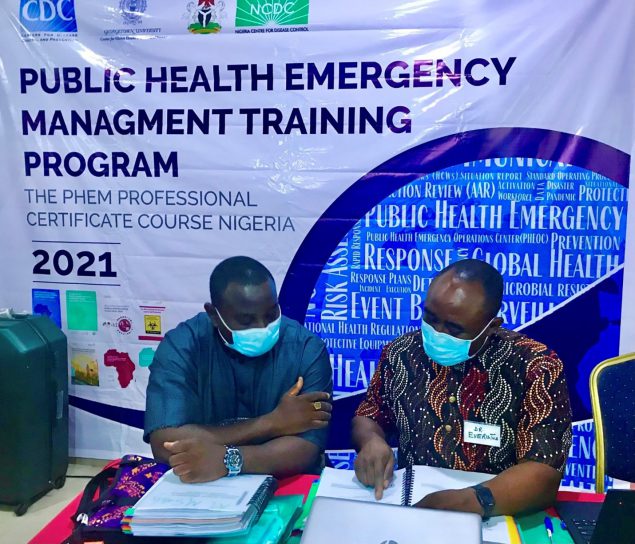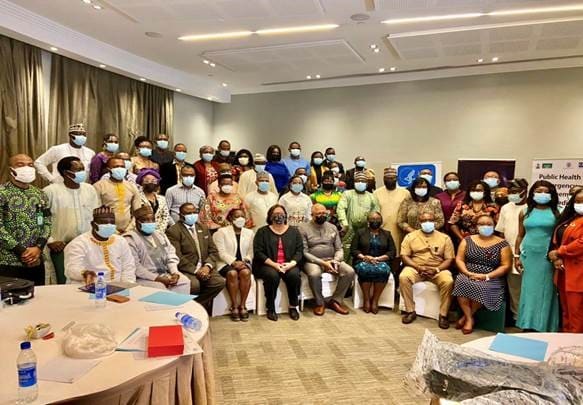CDC Helps Nigeria Launch New Emergency Management Certification Program
February 15, 2022

Official presentation of new PHEM Intermediate Participants’ Training Manual to Lagos State Director of Surveillance, Epidemiology & Health Security at the training venue, September 2021.
In 2019, Nigeria became a Global Health Security Agenda (GHSA) partner committed to achieving GHSA 2024 targets and International Health Regulation requirements. To help Nigeria achieve these targets, the U.S. Centers for Disease Control and Prevention (CDC) supported the Government of Nigeria by strengthening core outbreak response capacities in workforce development, surveillance, laboratories, and emergency response, among other areas. To enhance Nigeria’s emergency response capacity, Nigeria CDC (NCDC) partnered with CDC and Georgetown University to launch the Intermediate Public Health Emergency Management (PHEM) Certification Program. The intermediate PHEM certification is a first-of-its-kind initiative established to train public health experts on public health emergency response.

Facilitators (CDC-N and NCDC) reviewing a session on PHEOC De-Escalation and De-Activation during the training, September 2021.
The leadership of Dr. Chikwe Ihekweazu, former director of NCDC, and the NCDC team of PHEM experts have changed the response capacity of Nigeria’s public health system. Nigeria is committed to training Emergency Operations Center staff at the national and sub-national levels. The Intermediate PHEM Certification program is another sign of that commitment and positions Nigeria as a leader in the West African region that has the capacity to provide expert assistance not only to Nigeria but to neighboring countries during times of crisis. CDC’s National Public Health Institute (NPHI) program has played a central and critical role in coordinating and providing technical oversight to NCDC with oversight from Georgetown University for PHEM implementation.
The Intermediate PHEM training is part of the U.S. Government’s efforts to support pandemic preparedness globally. NCDC partnered with CDC’s NPHI Program and the Division of Emergency Operations to train a cadre of PHEM Experts who advanced beyond basic PHEM and Public Health Emergency Operations Center (PHEOC) capabilities. Similar to the Field Epidemiology Training Program (FETP), the PHEM program has different levels—basic and advanced. The intermediate certification is new and only launched in Nigeria. Although numerous countries have adapted to basic emergency management principles, the intermediate certificate program is more intensive and is the first of its kind globally.
The Intermediate PHEM professional development certification training in emergency management was held in September 2021 in Lagos with 35 participants drawn from NCDC and States Ministries of Health (SMoH) using a revised curriculum. PHEM experts and other support staff facilitated the course through virtual and in-person sessions. The two-week intensive training covered topics such as situational awareness, operations, planning, logistics, finance, law and authorities, public information, and crisis and emergency risk communication. NCDC Emergency Operation Centers now have certified emergency management experts at the national and subnational level. The training will continue in 2022 with training of additional cohorts of staff over a two week period.
CDC Nigeria Country Director, Dr. Mary Boyd, discussed the importance of the certification during the training, “Individuals are now more equipped to go back to their states and implement and also share the training with others at the state level.”
“This is an opportunity to build capacity and when we get back home, engage with our colleagues to ensure that we prepare for future outbreaks and continue to strengthen our various public health operations across the states.” – Dr. Uwa Okhuarobo, State Epidemiologist

Nigeria PHEM Intermediate Training session, September 2021.
As a result of the recent Intermediate PHEM training, Nigeria now has 35 trained PHEM experts in addition to the four international advanced PHEM Fellows, who were trained at U.S. CDC. Advanced PHEM Fellows have the necessary skills and experience to train Public Health Emergency Responders and practitioners at the intermediate level. In 2017, Nigeria had the largest outbreak of Monkeypox to date in Western Africa. Additional outbreaks, such as Ebola, Cholera, and, most recently, COVID-19, have emphasized the need for emergency response services. This increased workforce capacity plus having the largest FETP in Africa results in NCDC being a regional leader in times of crisis. In addition, the impact of this training has led to Africa CDC utilizing the PHEM successes in Nigeria to adapt and replicate in other countries.
Emergency management protects communities by coordinating and integrating all activities necessary to build, sustain, and improve a country’s capability to prepare for, respond to, and recover from public health threats such as infectious disease outbreaks, natural disasters, acts of terrorism, or man-made disasters. By having experienced and certified PHEM personnel, communities can respond faster to public health threats.